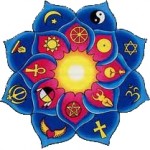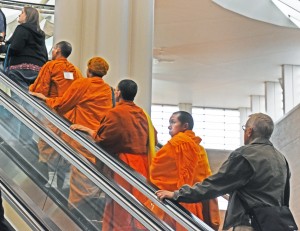In March, Rhyd Wildermuth and our fearless leader proposed a topic to which all interested parties on the Pagan channel could respond:
Much of the current dialogue in the Pagan blogosphere is about carving out ways to explain and justify our personal experiences and beliefs in relation to other traditions, but without a clear vision of the place our own traditions and experiences might have in an ideal world. Will the Pagan movement become one tradition-heavy set of religions with several “fringes”? Will it split apart into competing factions? Or will we find a way to unite using some shared cultural language? What institutions will we build, or will we build institutions at all? What rights or recognition will we have in the larger society?
What does your Paganism look like in 50 years?
First, a bit of history.
As has been pointed out to me on more than a few occasions, my views on Paganism were more than a little naive. For largely personal reasons (for example, wanting to feel as if I was part of the “in” crowd), for quite some time I tried to hold onto the belief that we were all one big happy family and, while we may not always do things the same way or practice the same traditions, we were largely doing roughly similar things. In other words, that what we were doing when we worked together at pan-Pagan events was largely intrafaith, i.e. a conversation had within one faith community.
I now know that to not be the case. However, I also know that our reality is better and stronger than my fantasy of a more universal Paganism and that pan-Pagan events more appropriately fall into the category of an interfaith action. Looking back, it’s a bit odd that I clung for so long to this idea when I’ve had such wonderful and strengthening experiences working with other, non-Pagan faith communities through my interfaith work, but that’s for me to ponder.
A little over a year ago, for a different project, I wrote briefly on this topic and, while I originally offered the idea somewhat in jest, I’ve begun to think of it as something that should be considered with more seriousness than my above image manipulation might suggest.
I recommend that we work in the coming decades to build a federation of Pagans, something that I’ve begun to think of as a the Pagan collective if only to avoid the possibility of trademark infringement.
Star Trek References
For those who aren’t familiar with Star Trek, the United Federation of Planets is the alliance of many diverse species living in within a quadrant of space about 8000 light years across (according to Wikipedia; I might like Star Trek but I am in no way as die hard a trekkie as some are). Humanity, as a space fairing species in the Star Trek canon, is not only a member of the Federation but one of those who worked to bring it into existence following galactic conflict in the hopes that such a conflict might never again be experienced in future generations.
If you’ve watched the series and movies set in the Star Trek canon, you know that things didn’t exactly work out that way, but by and large, the Federation acts largely as a voice for peace, diplomacy, exploration, and defense in our galaxy and, despite the diversity within the Federation, its members were largely allowed to build their own societies, have their own cultures and religions, and act in accordance with the dictates of their own morals as long as they agreed to certain guidelines set out in the federation’s charter.
The United Nations
It’s pretty clear to me that the idea for the Federation was based on the United Nations. Heck, portions of the Federation’s charter that I linked above paraphrase the chartering documents of the UN, so the connection between the two is not even remotely hidden. Despite the cries of some of the more conspiracy-minded among us, I doubt the UN is out to try and remove all sovereignty from member nations nor is its goal to homogenize cultures into one global human society (despite Star Trek’s portrayal of such a society). Frankly, there’s too many competing ideas within the member nations for such a goal to be achieved even if it is held by some of the delegates.
Instead, the UN focuses on international justice, human rights, peacekeeping, and aid to member nations in times of trouble. And, while it can be argued that the UN is too slow and sunk too deep in global political quagmires (especially with respect to the Security Council), I don’t think the stance that the UN is unnecessary can be defended. As sovereign nations, our human cultures need a place to which our grievances can be heard and addressed not at the barrel of a gun or the at the control panel of our drones, but rather with the voice of diplomacy.
The Pagan Collective
These are the models for what I would like to see us build. Is this a lofty goal? Certainly. Is there a lot of work to do? Of course. But, in the production of that work, we will be forced–both as individual religious communities as well as a larger pan-Pagan movement–to analyze what it means to be a Pagan and how (or if) that term applies to each of us.
Firstly, we’d have to figure out how different delegates are chosen. Other intercultural or interfaith organizations, like the UN or even the Parliament of World Religions, have somewhat clearly defined member communities based on national or historical cultural and religious affiliations. In Paganism, such affiliations are a little more loosely defined and so determining who gets a seat at the table would, I suspect, be more difficult for us than it might be for others.
It’s not enough simply to identify the different streams of thought within our community and try to provide representation for each of them because to do so could leave out the syncretic elements within our community. Further, how would solitaries be represented? How would we respond to new ideas and new religious movements like Otherfaith, and how would such a religious community seek to join the Pagan collective should they want to do so?
And, consider the fact that, at least stereotypically, Pagans are not exactly swimming in cash. Obviously, there are Pagans who may be comfortably wealthy and capable of the long-distance travel responsibilities that may come with being a delegate to such a collective. Further, we do have some large, national Pagan organizations (like the Covenant of the Goddess) or regional groups (the Assembly of the Sacred Wheel, for example) who might be able to assist with the expenses incurred by their delegates, but could a smaller, locally-focused group afford to send a delegate?
Assuming we’ve identified delegates and figured out how to get them together, physically or virtually, could such a group even accomplish anything? I think there’s a non-zero chance of it all falling apart, though I’d like to think that after putting in the effort to get that far, we’d try to stay the course and find some way of working together on a shared purpose. But, what should that purpose be? Frankly, I’d say that’s for the delegates to work out, and since we’re somewhere around step zero with respect to such a journey, there are things about which even speculation is difficult.
To conclude, I wonder if this is a situation where the journey toward the Pagan collective might not be at least as, if not more, important than the end goal of constructing such an organization. By working individually toward the goal of working together collectively, I suspect that we would all individually deepen and strengthen our religious communities. But individually strong religious communities should not be, in my opinion, the target at which we are aiming.
I hope, instead, that we work to strength our collective ties, weak though they may sometimes be, so that we can more effectively work together within that collective but also with religious communities as well.
















